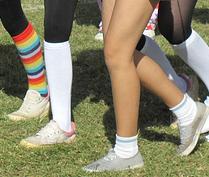Tapping web apps for better health: New study underway
Published on 24 May, 2012
A new clinical trial is set to assess how effective web apps are at getting Australians to increase their physical activity and improve their health.
The Walk 2.0 project, conducted by CQUniversity* and the University of Western Sydney, will recruit around 500 people who will each receive a pedometer to track the number of steps they take each day.

The research team has used the latest web 2.0 tools and apps to create a dedicated website to help those participating in the trial keep track of and communicate their physical activity with other users.
The website will also allow participants to access information to help them lead a physically active lifestyle.
The effectiveness of the new site will be tested against other participants assigned to an existing, conventional (web 1.0) physical activity site and a group who use a paper-based log book to record their activity.
Key body measurements for all participants, such as waist circumference and weight, will be recorded by the researchers at the start of the trial and then again at 3, 12, and 24 months.
CQUniversity researcher on the Walk 2.0 project, Dr Mitch Duncan, says the research will focus on increasing walking and other common activities people do throughout the day because they are relatively safe and most people can easily participate in walking.
"When it comes to improving your health and increasing overall activity level, walking is a great option," says Dr Duncan. "But the challenge has always been to get people to actually do it."
Despite many health campaigns, physical inactivity continues to contribute to ill health by increasing the risk of obesity, heart disease, diabetes, and some forms of cancer."
"Over half of the Australian population do not participate in enough physical activity to stay healthy. Yet there is a huge amount of new technology such as smart phones and fast, cheap internet access at home to help people take control of their health," says Dr Corneel Vandelanotte, another member of the CQUniversity team whose research is focussed on how to effectively use the internet to help people become more healthy.
"Because of the access people have to the internet we can provide large numbers of people with health information and people can access this information when and where their schedules allow it. Also we are seeing a significant increase in websites, blog sites and smart phone apps devoted to health and fitness and some of these allow users to monitor their progress. However at the moment there is little research about how people use this information and how it changes their behaviour. "
The study, funded by the National Health and Medical Research Council of Australia (NH&MRC), is recruiting participants from Central Queensland and Western Sydney.
Invitations to participate are currently being sent to randomly selected individuals in CQ and Western Sydney.
This trial has CQUniversity and UWS Human Research Ethics Committee approval.
* Via the Institute for Health and Social Science Research (IHSSR).

